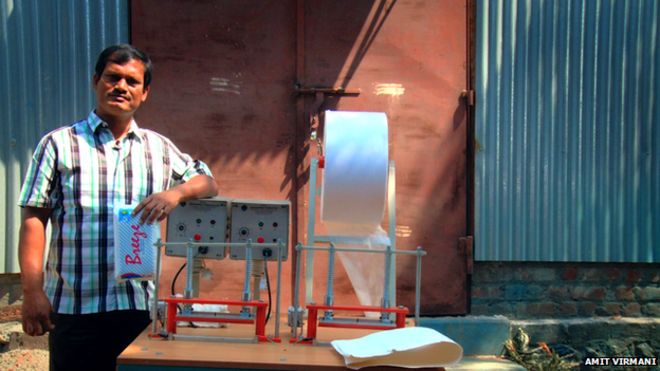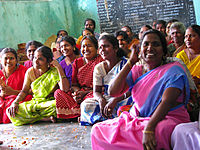Arunachalam Muruganantham (born 1962) is a social entrepreneur from Coimbatore in Tamil
Nadu, India. He is
the inventor of a low-cost sanitary pad making machine and has innovated
grass-roots mechanisms for generating awareness about traditional unhygienic
practices around menstruation in rural India. His mini-machines, which
can manufacture sanitary
pads for
less than a third of the cost of commercial pads, have been installed in 23 of
the 29 states of India. He is currently planning to expand the production of
these machines to 106 nations.In 2014, TIME magazine placed him in its list of 100 Most Influential
People in the World. In
2016, he was awarded Padma Shri by Government of India.

Early life Muruganantham was born in 1962 to S. Arunachalam and A. Vanita,
hand-loom weavers in Coimbatore, India. Muruganantham grew up in poverty after his father died in a
road accident.His mother worked as a farm labourer to help in
his studies. However, at the age of 14, he dropped out of school. He supplied
food to factory workers and took up various jobs as machine tool operator, yam
selling agent, farm labourer, welder, etc. to support his family. Invention In 1998, he got
married to Shanthi. Shortly after, Murugananthan discovered his wife collecting
filthy rags and newspapers to use during her menstrual cycle, as sanitary napkins made by multinational
corporations were expensive. Troubled by this, he started designing
experimental pads. Initially, he made pads out of cotton, but these were
rejected by his wife and sisters. Eventually, they stopped co-operating with
him and refused to be the test subjects for his innovations. He realized that
the raw materials cost 10 paise ($0.002), but the end product sold for 40 times
that price. He looked for female volunteers who could test his inventions, but
most were too shy to discuss their menstrual issues with him. He started
testing it on himself, using a bladder with animal blood, but became the subject
of ridicule when the "sanitary pad" was discovered in his village. As
menstruation is a taboo subject in India, it left him ostracized by
his community and family He distributed his products free to girls in a local
medical college, provided they returned them to him after use.
It took him two years to discover that the commercial pads used cellulose fibers derived from pine bark wood pulp. The fibres helped the pads absorb while retaining shape.[5]Imported machines that made the pads cost INR 35 million. So, he
devised a low-cost machine that could be operated with minimal training. He sourced the processed pine wood pulp from a
supplier in Mumbai and the machines would grind, de-fibrate,
press and sterilize the pads under ultraviolet before packaging them for sale. The machine costs INR 65,000.
Rural women meeting as members of self-help
groups (SHGs)
In 2006, when he visited IIT Madras to show his idea and got suggestions. They registered his
invention for the National
Innovation Foundation's Grassroots
Technological Innovations Award and his idea won the award. He obtained seed funding and founded
Jayaashree Industries, which now markets these machines to rural women across
India. The machine has been praised for its simplicity and cost-effectiveness,
and his commitment to social aid has earned him several awards. Despite offers
from several corporate entities to commercialize his venture, he has refused to sell out and continues to provide
these machines to self-help groups (SHGs) run by women.

Muruganantham's invention is widely praised as a key step in changing women's lives in India. Muruganantham's machine creates jobs and income for many women, and affordable pads enable many more women to earn their livelihood during menstruation.[18] In addition to his own outreach, Muruganantham's work has also inspired many other entrepreneurs to enter this area including some that propose to use waste banana fibre or bamboo for the purpose

Muruganantham's invention is widely praised as a key step in changing women's lives in India. Muruganantham's machine creates jobs and income for many women, and affordable pads enable many more women to earn their livelihood during menstruation.[18] In addition to his own outreach, Muruganantham's work has also inspired many other entrepreneurs to enter this area including some that propose to use waste banana fibre or bamboo for the purpose
Popular culture
Muruganantham has become well known as a social entrepreneur. He
has given lectures at many institutions including IIT Bombay, IIM Ahmedabad, IIM Bangalore[1] and Harvard. He has also given a TED talk. His story was
the subject of a prize-winning documentary by Amit Virmani, Menstrual Man. R. Balki has roped in
Akshay Kumar for the biopic on Arunachalam Muruganantham, titled as Pad Man.
TIME
MAGAZINE
Mr. Muruganantham has been
accorded the recognition as Time Magazine’s 100 Most Influential
People in the World 2014 for
his accomplishments. He is in the company of the likes of Narendra
Modi, Barack Obama, Serena Williams, Ronaldo, Xi Jinping, Jeff Bezos, Malala,
Shinzo Abe, Beyonce, Putin, Arundhati Roy, Hilary Clinton etc., to name a few of the 100.
Latest
Achievements
Muruganantham for his
accomplishments and well deserved recognition as Time Magazine’s 100 Most
Influential People in the World 2014.He is in the company of the
likes of Narendra Modi, Barack Obama, Serena Williams, Ronaldo, Xi Jinping,
Jeff Bezos, Malala, Shinzo Abe, Beyonce, Putin, Arundhati Roy, Hilary Clinton
etc., to name a few of the 100.He was awarded “Jewel of
Coimbatore ” by Rotary Coimbatore metropolis this award earlier received by
Management Guru.C.K.Praghalath.
Vision of
Muruganantham
Muruganantham says, “creating
one Million livelihoods for poor women and making India as 100 % sanitary
napkin using country from current level of only 2% in rural also it will
generate employment for one million women. No one is bothered about uneducated
and illiterate people. Through this model, they can live with dignity.”
No comments:
Post a Comment